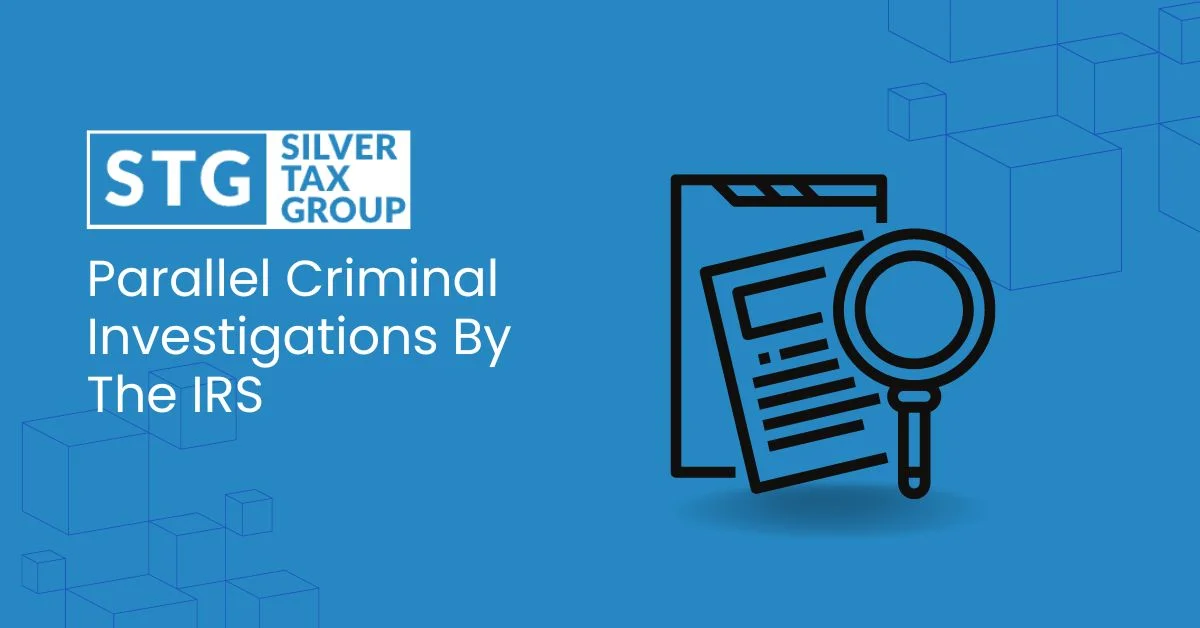The Basics Of A Parallel Criminal Investigation By The IRS

The Internal Revenue Service (IRS) has the right to audit a taxpayer’s finances at any time and if they suspect evidence of criminal activity, they can open up a parallel criminal investigation. The process of an IRS parallel criminal investigation is daunting for anyone involved and there are serious potential consequences you should be aware of. As taxpayers, it’s important to understand the basics when it comes to dealing with such investigations so that you know what kind of power the IRS ultimately holds over your financial situation. In this post, we’ll break down how these investigations work, what rights you have as a tax payer during one, and how to protect yourself against them in best way possible.
The Definition Of A Parallel Criminal Investigation By The IRS
An IRS parallel criminal investigation involves simultaneous civil and criminal proceedings initiated against the same taxpayer. Criminal proceedings are always more serious than civil ones; therefore, this type of investigation is one of the most serious IRS enforcement measures and carries significant penalties, including jail time. A person who is being investigated for a possible violation should retain experienced legal counsel as soon as possible to protect their rights during the process and minimize any potential for sanctions.
Don’t Incriminate Yourself While Under Investigation
Secure the representation of an experienced attorney today.
An Overview Of Parallel Criminal Investigations
Parallel criminal investigations conducted by the Internal Revenue Service (IRS) have been proven to be vital tools in cracking down on tax-evasion related crimes. With the ever-increasing complexity of the tax codes, the IRS has put in place a parallel investigation program that allows for both criminal and civil investigations.
The importance of parallel criminal investigations is to ensure that all necessary leads and evidence are gathered to fully prosecute and impose penalties on tax evaders. During these investigations, the IRS can seize assets such as cash, homes, and vehicles through civil investigation. This action can happen even before the criminal charges are filed, which hinders the taxpayer’s ability to continue any criminal wrongdoing.
Furthermore, a parallel investigation by the IRS provides several advantages over regular criminal investigations. The IRS can execute searches without warrants in certain situations, which makes it easier for them to obtain evidence. It can also result in more significant penalties being imposed if a taxpayer is found guilty of evading taxes or under-reporting taxable income. The parallel investigation also encourages earlier resolution of the case, which means that the taxpayers under investigation do not have to wait long to finalize their tax liabilities.
Parallel criminal investigations by the IRS have helped to prevent tax avoidance and evasion. They have also provided important deterrence to those who may be considering tax-related criminal activities. In addition, the parallel investigation can unearth other illegal activities such as money laundering, corruption, and other frauds.
What Is Involved With An IRS Parallel Criminal Investigation?
An IRS parallel criminal investigation involves the coordination of investigators from the IRS Criminal Investigation Division and other government agencies, such as state and local law enforcement.
These investigations focus on uncovering evidence of tax fraud or other financial crimes. Generally, a parallel criminal investigation entails thoroughly examining an individual’s finances and assets to discover any hidden or illegal activities and uncovering potential links between suspects and their potential conspirators.
The data collected is then compared with information obtained from other sources, including third parties, financial institutions, accountants, lawyers, etc., to gather enough evidence to support legal action against the suspect.
Explanation Of How Parallel Criminal Investigations Work
Parallel criminal investigations are conducted by multiple government agencies working together to uncover evidence of tax fraud or other financial crimes. Investigators collect data from sources such as third parties, financial institutions, accountants, and lawyers and then compare it with information obtained from other sources to build enough evidence to support legal action against the suspect.
Potential Consequences For Those Under Investigation
Potential consequences of an IRS parallel criminal investigation include:
- jail time,
- fines,
- and other penalties.
Depending on the severity of the offense, a person under investigation may face civil or even criminal charges. Additionally, the investigation may result in stolen property seizure, bank account freezing, or loss of professional licenses. In extreme cases, an individual can be sentenced to serve time in federal prison.
Common Indications That Someone May Be Under Investigation For Tax Fraud Or Other Crimes
Some common indications that someone may be under investigation for tax fraud or other crimes include suspicious activity in bank accounts, large cash deposits or transfers, falsified financial documents, discrepancies in itemized deductions, repeated use of false social security numbers, failure to file taxes on time and a history of failed attempts to pay taxes. Additionally, investigators may look into a person’s lifestyle as an indication of possible illegal activities.
Tips For Protecting Yourself In Situations Of Parallel Civil And Criminal Proceedings
If you suspect that you or someone close to you may be under investigation for tax fraud or other crimes in civil and criminal cases, there are some steps you can take to protect yourself:
- Consult with a lawyer who specializes in criminal law and have them review your records.
- Resist answering questions from investigators without legal counsel present.
- Stop any activity that could be seen as fraudulent or illegal immediately.
- Refrain from speaking to anyone, even close friends and family members, about your case.
- Be honest with your attorney about all the facts surrounding the case.
- Gather evidence and documentation to corroborate your story.
How To Determine If A Person Is Subject To Criminal Charges Or Civil Sanctions
Before determining if a person is subject to criminal charges or civil sanctions, it is important to understand the differences between them. Criminal charges are used to punish individuals for committing illegal acts, while civil sanctions are used to impose monetary fines and other forms of a punishment without involving criminal law.
To determine if an individual is subject to criminal charges or civil sanctions for breaking tax laws, you need to consider the type and severity of the offense. Generally, more severe offenses, such as fraud and evasion, will result in criminal charges, while less serious offenses, such as failure to file taxes on time, may only result in civil sanctions. It also depends on the jurisdiction where the offense was committed; some jurisdictions have stricter penalties than others when it comes to tax law violations. Lastly, each case should be reviewed by a qualified lawyer who can provide more specific advice depending on the facts surrounding the case.
Investigating Hidden Assets In An IRS Parallel Criminal Investigation
The Internal Revenue Service (IRS) has a variety of methods and tools to uncover hidden assets during a parallel investigation. These methods include conducting audits, issuing summonses and subpoenas, gathering financial records from third-party sources, using informants, utilizing data-matching systems, deploying undercover agents and surveillance techniques, and cooperating with other agencies.
Audits involve in-depth reviews of the taxpayer’s financial activity which may lead to discovery of hidden assets or undisclosed income. Agents may also issue summonses and subpoenas if they require information not provided by the taxpayer. Financial records can be obtained from banks and other third-party sources to reconstruct transactions or trace assets. Informants can provide tips or leads on unreported income that might otherwise not be discovered.
The IRS has access to sophisticated databases and systems such as FINCEN which allow them to match financial information against various databases for suspicious activity. Undercover agents can be used to infiltrate organizations or industries in order to uncover fraud or unreported income. Surveillance techniques such as video surveillance or GPS tracking may be used when necessary. The IRS also cooperates with various agencies both inside and outside of the United States in order to combat tax evasion across borders.
Strategies For Responding Appropriately To Requests From The IRS During An Investigation
It is important to respond appropriately and promptly to requests from the IRS during an investigation. There are a few key strategies for responding in the best way possible:
- Gather all documents that are relevant to the request: Gathering any pertinent financial records and documents can help ensure that you submit accurate information and increase your chances of achieving favorable results. Any discrepancies between your stated income and what is on the document should be addressed in advance.
- Consult with a tax attorney: Consulting with an experienced tax attorney can help you prepare for any legal issues that may arise during the investigation and advise you on how best to respond.
- Timely filing: It is important to file any requested documents or forms within the time frame specified by the IRS. Failure to do so could result in additional penalties or fines.
- Do not provide false information: Providing false information or omitting relevant details can potentially lead to criminal prosecution, so it is important to answer truthfully and accurately when asked questions by an IRS agent or auditor.
- Keep records of communication: Keeping records of all communications with the IRS can help protect you if any legal issues arise later on. Copies of letters, emails, or other correspondence should be kept for future reference in case questions arise about their contents months down the line.
Don’t Incriminate Yourself While Under Investigation, Get Proper Representation From An Experienced Attorney
It is important to remember that an IRS parallel criminal investigation could have serious consequences and can even lead to jail time. It is vital to seek out immediate representation should you find yourself or your business under this type of investigation, as it helps provide legal defense throughout the proceedings.
It is also crucial to ensure that all taxation records are in order, as inaccurate tax returns could be grounds for suspicion. Being informed and prepared ahead of time are key components of fighting the potential outcome that comes with an IRS parallel criminal investigation.
Ultimately, the best measure one can take going into any sort of investigation is to engage a legal team with experience in these complex matters and make sure to cooperate intelligently rather than incriminate yourself. Don’t try to go at it alone – enlist a knowledgeable legal representative today!





Free Consultation 24/7
Chad Silver
Attorney

Silver Tax Group Locations


777 South Flagler Drive
Suite 800 – West Tower
West Palm Beach FL 33401

4005 Guadalupe St
Suite C
Austin, TX 78751


